This is an extension of a post I made over at Mythic Scribes in which authors were asked to explain their magic systems in five bullet points. This was fun, in no small part because with the increased role of magic in, well, The New Magic, some readers have been asking exactly how magic works in Gateskeep and the surrounding neighborhood.
My magic system is pretty simple.
A little background: I was raised in a Native American household, steeped in tradition, which included a strong belief in magic. There were never any “rules” to magic the way that we were taught about it; there were just things you did and didn’t do. My stepfather, who raised me from the time I could walk, was descended from a Blackfeet medicine man, so we took this all pretty seriously.
I wanted the world in my series to feel the same as the world I grew up in: highly superstitious, with 100% unwavering belief that magic is real and everywhere, but with none of it fully understood and therefore all of it scary as hell. Also, no “leveling up,” no hard and fast rules, no fucking midichlorians. Explaining magic turns it into math.
So, five bullets about magic in my series:
- Many people have varying levels of psychic ability, with the most common abilities being telepathy and telekinesis.
- Abilities can be trained and improved through study under those who have similarly learned to improve their abilities (magisters).
- Causing direct harm with magic is punishable by death, and everyone works to train it out of the young whenever possible.
- Nearly all magic falls under variations of telepathy and telekinesis: long-distance communication, for instance, involves high-order telepathy, whereas weather control, psychic healing, conjuring, and teleportation all involve high levels of telekinetic ability.
- Teleportation, conjuring, and high-order, “wow-factor” magic are possible because the fabric of the universe is wobbly in the corner of the world where they live, and the most powerful psychics can manipulate it. People with that kind of power are rare, and they’re considered the true “sorcerers.”
This last point is the key to the way the world works, because the ability to rip and fold space-time means their little corner of the world is a nexus between other planets. Beings from other worlds are referred to as “demons,” including Jarrod, Carter, and Ulo. Overall, though, very few are human; some demons are like the thing that Heggy and Galé tangled with. In Dragon’s Trail, the sorcerer Crius explains to Jarrod and Carter that humanity on Earth originated in their world, via a mass exodus to Earth after a war.
The fabric of the universe is wonky in that corner of the world because of the effects of a substance central to my next series, which is as close as I’m going to get to crossing science with my magic.
The Outworlders is, among other things, a theoretical sandbox examining the role of superweapons in conflict escalation–international conflict analysis is what I do, professionally–so I needed to use the characters from Earth and their advantages (technological, educational, martial, and so forth) to imbalance things in order to set the ball rolling.
However, to pull this off, I had to build in a series of factors to induce intractability. Primarily, that meant ensuring that the magic in the world didn’t already have the ability to destabilize anything on its own. Magic couldn’t function as any sort of weapon that would give one side an advantage over the other.
To this end, I developed strict limitations on the uses of magic; some of them innate to magic itself, some of them hammered out through the rigors of instruction, and some of them handed down by edict and enforced at swordpoint if necessary. The inviolable rule is that in my world, you don’t use magic to harm people. It’s not taught, it’s not tolerated, it’s not done.
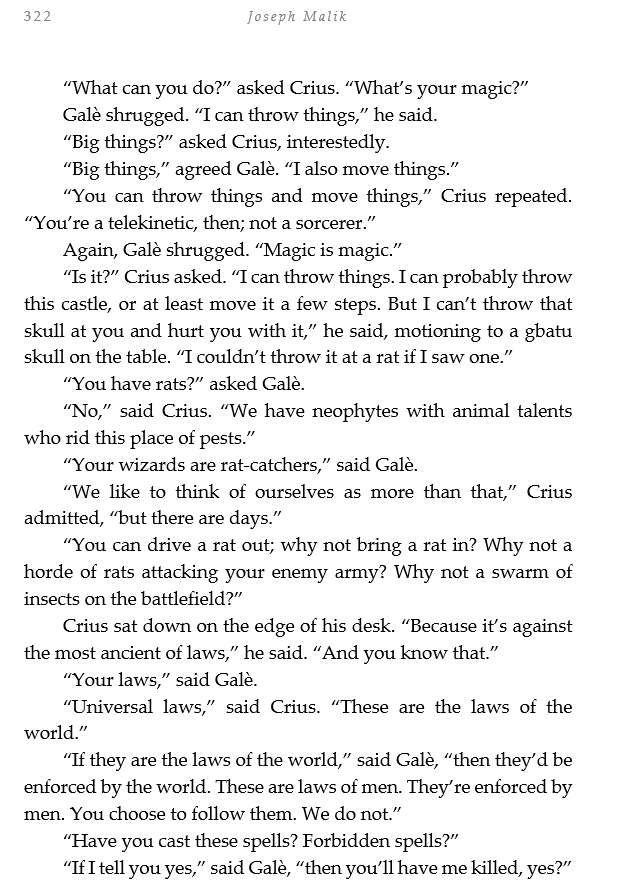
The New Magic is the beginning of the world hitting back at the characters by, among other things, bringing up a forbidden type of magic–war magic–to counter the technological and educational advantages that the characters bring with them. This is where we see the fundamental vs. ethical limitations on magic coming to odds, and also the idea of technology as a form of magic in and of itself. This last bit is not a new concept in fantasy and sci-fi, but equivocating magic and technology as constructivist stressors is really fun.
So, as the war ramps up and starts to spin out of control, with the world struggling to adapt to the presence of the people from Earth, I need them to start to wonder if limiting magic was such a good idea after all.
A reviewer recently made an astute observation about the apparent uses of magic in the books by pointing out that I’m writing the series from the perspective of an unreliable narrator.
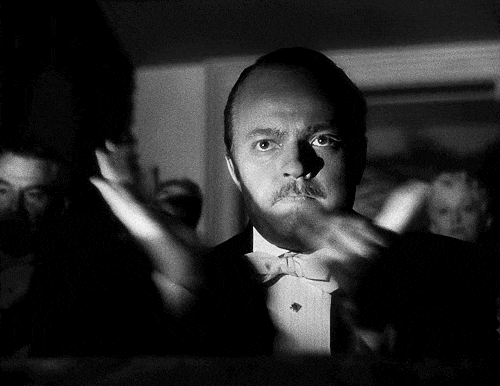
So, we’re delving back into voice for a bit, because the narrative voice is, in part, a limiting factor of the magic system.
The narrator who’s telling you the story in both books is omniscient in voice only. It’s told from his point of view, but he doesn’t know everything. In fact, there’s quite a bit about the world that’s still fuzzy to him.
This is a slant on the naïf, one of the five common tropes of the unreliable narrator, the others being the exaggerator, the clown, the madman, and the liar. I originally got the idea from reading Rothfuss’s Kingkiller Chronicles, whose main character, Kvothe, appears to be a combination of the exaggerator and the liar as he narrates sections of his life to a scribe.
I flipped it around and wrote The Outworlders from what is effectively the scribe’s point of view. It’s told in retrospect, the way he’d tell it over beers years later, instead of relating the story as he’s writing.
As the author, I have to understand how every last detail works in the world of the series–I have enough worldbuilding socked away in a trunk to support at least three more series in this setting–but it would break suspension of disbelief if the books were narrated by someone who understood every corner of the world, particularly the magic. This brings us back to voice.
I needed to write this series from a narrator’s perspective, because (refer to my previous posts on voice) we choose POV to determine what information we give our readers. To make the series work and create the necessary tension–especially in Book II, when things go sideways–I needed to filter the information that you receive.
I also wanted to write this all in a modern voice, which meant using a narrator from modern-day Earth. And I couldn’t do it in first-person, because that would actually cause you to understand the world even less. To tell this story they way I needed it told, the narrator had to have spoken to several people involved in the story.
However, the narrator only knows what he’s been told. The parts of the story from Jarrod’s and Carter’s perspectives, particularly the parts involving magic, aren’t explained very well, because, as we discussed above, they don’t understand them. It’s not their lane.
I appreciate that this isn’t a typical approach in fantasy, where magic is often both perfect and perfectly explained, sometimes clear down to exact percentages of dragon blood, or fractions of godhood, or even descriptions of leveling up and flashing hit points in the sky in some LitRPG novels.
Also, my experience has been that many omniscient narrators, especially those written by fledgling authors, are actually the authors explaining everything. That’s not what the omniscient narrator is for. (We’re used to it, because we’re used to limited third person, with perspective shifting from scene to scene explaining every plot point.)
The questions that you have at the end of The New Magic, which are the same questions that Jarrod has, are my version of a cliffhanger. You’re confused because he’s confused. It’s the second act, so this is exactly how it’s supposed to be: How can Vader be Luke’s father? Where did Han go? Why is Lando wearing Han’s clothes?

I’m just going to reiterate this: my narrator is not me. He’s just another character.
His knowledge is imperfect, and it has to be, in order for me to write the story that he needs to tell and to create the tension that’s left at the end of The New Magic. It’s the narrator’s story, not mine, and not even Jarrod’s. You’ll meet the narrator in Book III, and trust me, a lot of the questions lingering at the end of The New Magic will be resolved in another 500 pages or so when we wrap this up.
A few questions will remain, however, and a few new ones are going to come up before we’re done. A whole new series is coming that will answer them.
So. Enjoy. Go back and thumb through Dragon’s Trail and The New Magic and take a closer look at how I did this, and see if there’s an application in your own writing for unreliability. Feel free to hit me up with questions below.
The magic, however, is about as developed as it’s going to get.
Most of all, have fun.


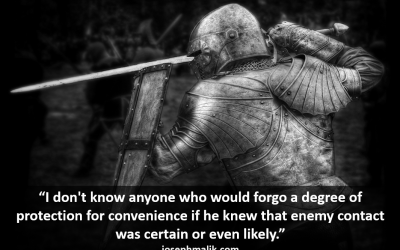
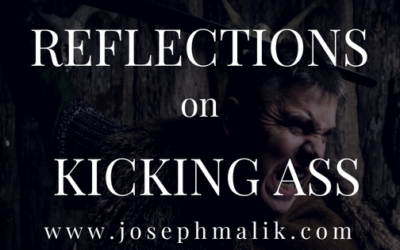
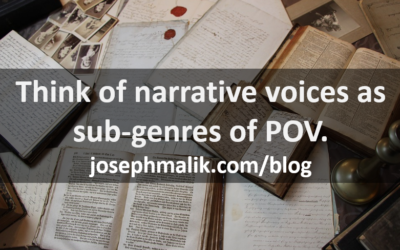
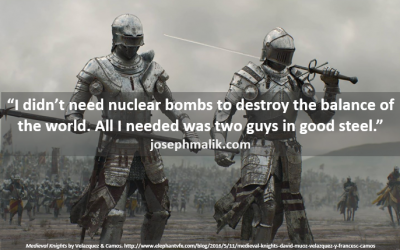
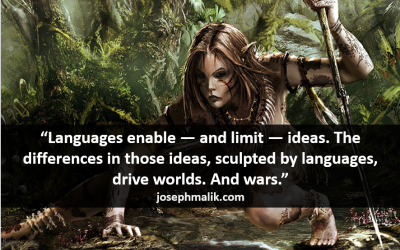
Have to say, I stopped reading the New Magic partly for reasons related to this post. One, I found the mixing of limited third and omniscient narration jarring. I’m fine with omniscient when it’s done well, but just sprinkling it in like you do doesn’t make for a smooth and immersive reading experience.
And now, learning that it was suppose to be an unreliable narrator bothers me even more. Even this post confuses me: you say it’s an omniscient narrator but then also say “parts of the story from Jarrod’s and Carter’s perspectives.” Huh?
I think I get what you’re attempting here, but man it can make for a confusing read at times.
Second, I didn’t find the role of magic with the narrative and conflict to be plausible. For one thing, I didn’t understand why magic wasn’t used in combat. Looks like you finally explain that but this should’ve been explained WAY earlier. I shouldn’t have read one and three-quarters of your books and been confused by this. (Though really, we’re meant to believe that wizards are all just going to be benevolent with their magic use? So it’s against the rules to use magic to harm people… but it’s okay to use magic to create animals of war (gryphons etc), or to go get Jarrod (another weapon) that then are used to harm people? So it’s okay to use magic indirectly in war, but not directly… huh? )
But even if I can believe that magic isn’t used in combat or to harm others simply because it’s against the rules, why if having a warrior from Earth was such an advantage didn’t they return for more? If having Jarrod can turn the tide, why not go back to get ten more Jarrod’s? And shoot, why again don’t they just teleport back to Earth for more (and bigger) guns?
Really loved the premise and tone of the series, but some things feel like they needed to be thought out more, while the narrative techniques used too often pulled me out of the story.
Wow. Great questions. Let’s see how much of this I can clear up. Answers in-line.
MILD SPOILERS FOR BOTH BOOKS.
you say it’s an omniscient narrator but then also say “parts of the story from Jarrod’s and Carter’s perspectives.”
This is correct. Both books are in omniscient voice throughout; they are told by a narrator.
However, the narrator is not all-knowing, as I’d said above. The narrator heard the story from some of the characters involved. You’ll see how this plays out in Book III. I work in intelligence and wrote this during a mobilization, where this kind of second- and third-hand information comprises the majority of reporting.
it’s okay to use magic indirectly in war, but not directly
This is exactly correct. This was covered early in Dragon’s Trail, when Crius explains to Jarrod what wizards can and can’t do. It’s on pages 53 & 54 in the hardcover, after Jarrod wakes up, when Carter takes him to meet Crius. It’s forbidden to use magic to do harm directly. It’s “schooled out through the rigors of instruction,” and also illegal as hell.
To reiterate, I needed to induce and maintain intractability. This whole thing is a sandbox for me to play out some theories I’ve been working with on how weapons technology can affect a stalemated conflict. If magic had already been weaponized, then nothing that the characters could ever do would have any kind of world-changing consequences. Plus, there’d be nothing to keep a wizard from striking our hero dead with the snap of a finger.
We get an inkling that Ulo is breaking the rules on this toward the end of Dragon’s Trail when he kills everyone in the room telekinetically. (This mirrors Jarrod’s employment of his sidearm as a potentially world-changing escalation of force in the previous scene.) In retrospect, I could have made a bigger deal out of the leadership’s reactions, but since Jarrod didn’t really grasp the enormity of the situation, neither did the narrator. Plus, Jarrod was far more interested in un-assing the AO in the name of self-preservation.
But even if I can believe that magic isn’t used in combat or to harm others simply because it’s against the rules, why if having a warrior from Earth was such an advantage didn’t they return for more?
They absolutely did. That was pretty much the entire plot of The New Magic. They didn’t do it en masse because being able to open a portal between worlds is a huge deal, and only a handful of wizards have that kind of power. In the opening of Dragon’s Trail, the council asks Crius, Lord High Sorcerer, to go to Earth and bring back a demon because he’s the only one they know of who can pull it off.
This is why Falconsrealm is so concerned about a wizard as powerful as Jerandra being loose in the wild and unaccounted-for, even before they realize that she can cause harm with her magic: they know their new enemy has conjured up another demon from Jarrod’s world, which rattles Adielle so badly that her immediate reaction is to send Jarrod to find and kill the wizard responsible. (It was an impulsive order that made sense in the heat of the moment, but it then derails the entire conflict and makes everything worse. I wrote it as a jab at an officer I had worked with.)
As we saw in the prologues to both books, the whole society is scared shitless of “demons,” which is what they call beings from other worlds. Gale and his team are Ulo’s resident demon-killers; that’s how big of a deal it is. In Dragon’s Trail, Edwin thought that exposing Jarrod as a demon would make Jarrod’s team abandon him.
And shoot, why again don’t they just teleport back to Earth for more (and bigger) guns?
(Ahem. Cough.) There’s a whole new series coming after this.
Jarrod considered this in Dragon’s Trail when he went home before the rescue mission. He considered taking Crius and Saril to go get firearms in Vermont–where there’s no waiting period–but he was worried about the time it would take.
There’s also a scene toward the end of The New Magic where Jarrod is lying awake ruminating on the fight with Elgast at the end of Dragon’s Trail, and he figures that he’d be executed if anyone construed his pistol to be a magic weapon. This is why he doesn’t just shoot Renaldo in the final duel.
I’d like to take a moment to thank you for all this. Your comments have got me thinking about a few things as I build out Book III. You should consider beta-reading, or possibly even developmental or continuity editing.
I just wanted to say that I really appreciate your response. Not many authors would be willing to address criticism like this, and certainly not with such a humble and non-defensive attitude.
Obviously some of this didn’t quite click with me, but I wish you the best.